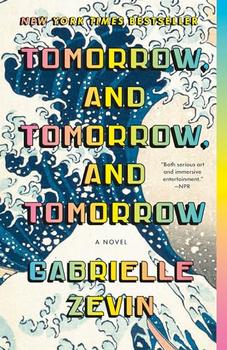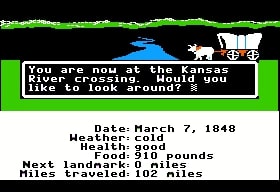Summary | Excerpt | Reading Guide | Discuss | Reviews | Beyond the Book | Read-Alikes | Genres & Themes | Author Bio

A novel
by Gabrielle ZevinThis article relates to Tomorrow, and Tomorrow, and Tomorrow
 Before they became video game developers, the main characters in Gabrielle Zevin's Tomorrow, and Tomorrow, and Tomorrow were kids growing up in the 1980s, and like countless other Generation X kids, one of the first video games they fell in love with was The Oregon Trail. Many people of this age group probably remember hunting for deer and buffalo, trading for supplies, and possibly dying of dysentery on a westward journey to the Oregon Territory — all from the comfort of the Apple II computers in their school computer labs.
Before they became video game developers, the main characters in Gabrielle Zevin's Tomorrow, and Tomorrow, and Tomorrow were kids growing up in the 1980s, and like countless other Generation X kids, one of the first video games they fell in love with was The Oregon Trail. Many people of this age group probably remember hunting for deer and buffalo, trading for supplies, and possibly dying of dysentery on a westward journey to the Oregon Territory — all from the comfort of the Apple II computers in their school computer labs.
The Oregon Trail is actually older than most people might know. The idea for the game was initially conceived in 1971 by a group of recent college graduates, one of whom, Don Rawitsch, later got a job at the Minnesota Educational Computing Consortium (MECC), a pioneer (pardon the pun) in developing educational software for Minnesota schools. MECC soon expanded its distribution nationwide, and The Oregon Trail quickly became its most popular game once it was widely available in schools and later homes. One estimate places the total number of copies of the game sold at more than 65 million.
The Oregon Trail has gone through numerous iterations during its 50-year history. From that first game that used a teletype machine and a simple series of questions and commands, the game evolved to include graphics, motion, sounds, music and color. In 1995, MECC launched The Oregon Trail II, which preserved many elements of the 1980s version, but with improved graphics, more flexibility (users could now choose among 20 different starting years for their westward journey), and more complex gameplay. But Gen-Xers, for the most part, seem to have the greatest fondness for that version they played on their Apple IIs, and more recent nostalgia-fueled reboots of the game, including a mobile version and a board game version, all pay homage to that 1980s classic.
And what happened to the developers of that 1971 prototype game? Since the creators essentially gave it to MECC for free, they didn't receive a dime from sales of the game, or from subsequent versions. The creators were honored with a ceremony at the Mall of America to mark the 10-year anniversary of the game's widespread distribution, but other than that, what they've mostly gained is the knowledge that their creation holds a beloved spot in the hearts of millions of Americans — and perhaps even inspired the next generation of game developers.
The Oregon Trail computer game screenshot, courtesy of Wikimedia Commons
Filed under Cultural Curiosities
![]() This article relates to Tomorrow, and Tomorrow, and Tomorrow.
It first ran in the August 3, 2022
issue of BookBrowse Recommends.
This article relates to Tomorrow, and Tomorrow, and Tomorrow.
It first ran in the August 3, 2022
issue of BookBrowse Recommends.
Your guide toexceptional books
BookBrowse seeks out and recommends the best in contemporary fiction and nonfiction—books that not only engage and entertain but also deepen our understanding of ourselves and the world around us.